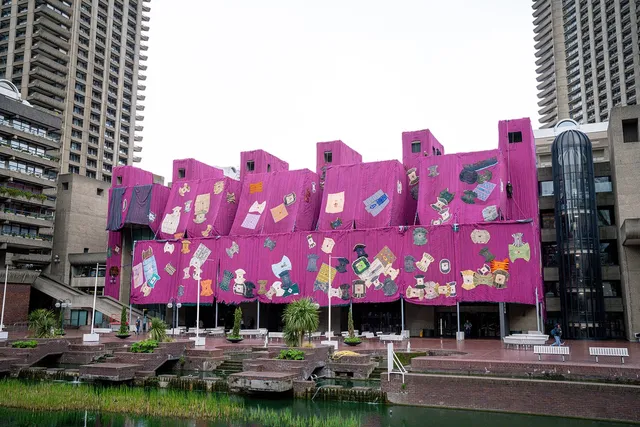Ibrahim Mahama unveils made-in-Ghana stadium in London
Ibrahim Mahama’s work at the Barbican, with its vibrant colors and intricate weaving, serves as a powerful reminder of the interconnectedness of global economies and histories. The use of traditional Ghanaian robes and the collaboration with local craftspeople further emphasizes the importance of community and shared heritage in his practice.
The controversy surrounding the Unravel exhibition highlights the ongoing tensions surrounding politics and art, and Mahama’s response underscores his commitment to engaging with complex issues through his work. Winning the Sam Gilliam Award and upcoming exhibition at the Fruitmarket gallery in Edinburgh showcase the growing recognition and success of his practice on an international stage.
Read details
Visitors to the Barbican centre in London will see swathes of pink and purple across the building this spring rather than the usual concrete exterior thanks to the Ghanian artist Ibrahim Mahama. His large-scale public art piece, Purple Hibiscus—made of 2,000 square metres of woven cloth—covers the lakeside façade of the brutalist structure, creating a vivid contrast against the grey building and sky.
The work was sewn together by more than 1,000 weavers and seamstresses at the Alui Mahama sports stadium in Tamale, Ghana (an accompanying film gives an idea of the scale of the work, showing a plethora of craftspeople knitting the piece together on the football pitch).
“The period for the commission was quite short—roughly seven months to produce the entire work so we had to get a lot of people in order to get the work. I had to rent the stadium also; the days when they weren’t playing football games, we were playing [art] games!” Mahama tells The Art Newspaper, outlining how the commission helped bolster the local economy. “There is a lot of unemployment; we had to use the money that came from the commission to pay these people over seven months.”
When the work is deinstalled in August, the entire piece will go back to Ghana. “There are certain projects I did such as the National Theatre [the venue in Accra was covered in a blanket of jute sacks]… so I think it might be interesting to use the material to wrap this building.”
Mahama has also incorporated into the fabric more than 130 traditional Ghanaian robes known as batakaris, which are handed down through families across numerous communities. These garments reflect “Mahama’s deep interest in the life cycles of textiles and what can be learnt from the historical memories embedded within them”, a statement says.
“I’ve never made a work in this colour and on this scale,” Mahama says. “When I came here, Shanay [Jhaveri, head of visual arts at the Barbican] was telling me about the history of the site; they used to sell rags here [in the Cripplegate district] before the Second World War. I’ve always believed materials contain spirits and souls. So I thought, if they were selling rags here, then historically the site still contains those spirits in a way. I thought why not work with these materials from Ghana which have been worn over the body and contain the sweat of the body.”
He highlights the global, geo-political aspect of the Barbican project. “The threads [for the covering] are coming from China… I was interested in what [the work] represents on a global scale in terms of politics… art has that responsibility and power—[we are] able to take something that seems very local and then open up the connections within it on a global stage.”
Mahama’s piece forms part of the exhibition Unravel: The Power of Politics & Textiles in Art (until 26 May) which has sparked controversy after two collectors, and the artists Yto Barrada and Cian Dayrit, removed works from the show over the Barbican’s decision to cancel a talk on Palestine and the Holocaust.
Asked about the boycott, Mahama says: “I am coming from ground zero… a lot of these histories [linked to the Global South] are tied to debt and these debts all come back to Europe. I would say that we should have boycotted Europe a long time ago because the politics in Europe has put the Global South in a bad way [condition]… I want to further understand; art is not about withdrawal but about re-inserting yourself, even as problematic as things are, and then within that go much deeper into the politics.”
Mahama is having a moment; last month he won the inaugural Sam Gilliam Award, a prize created last year by Dia Art Foundation and the Sam Gilliam Foundation in honour of the late artist’s legacy (Mahama will receive $75,000 and feature in a public programme at Dia in autumn of this year). Meanwhile, Mahama will present a new body of work at the Fruitmarket gallery in Edinburgh later this year.























































